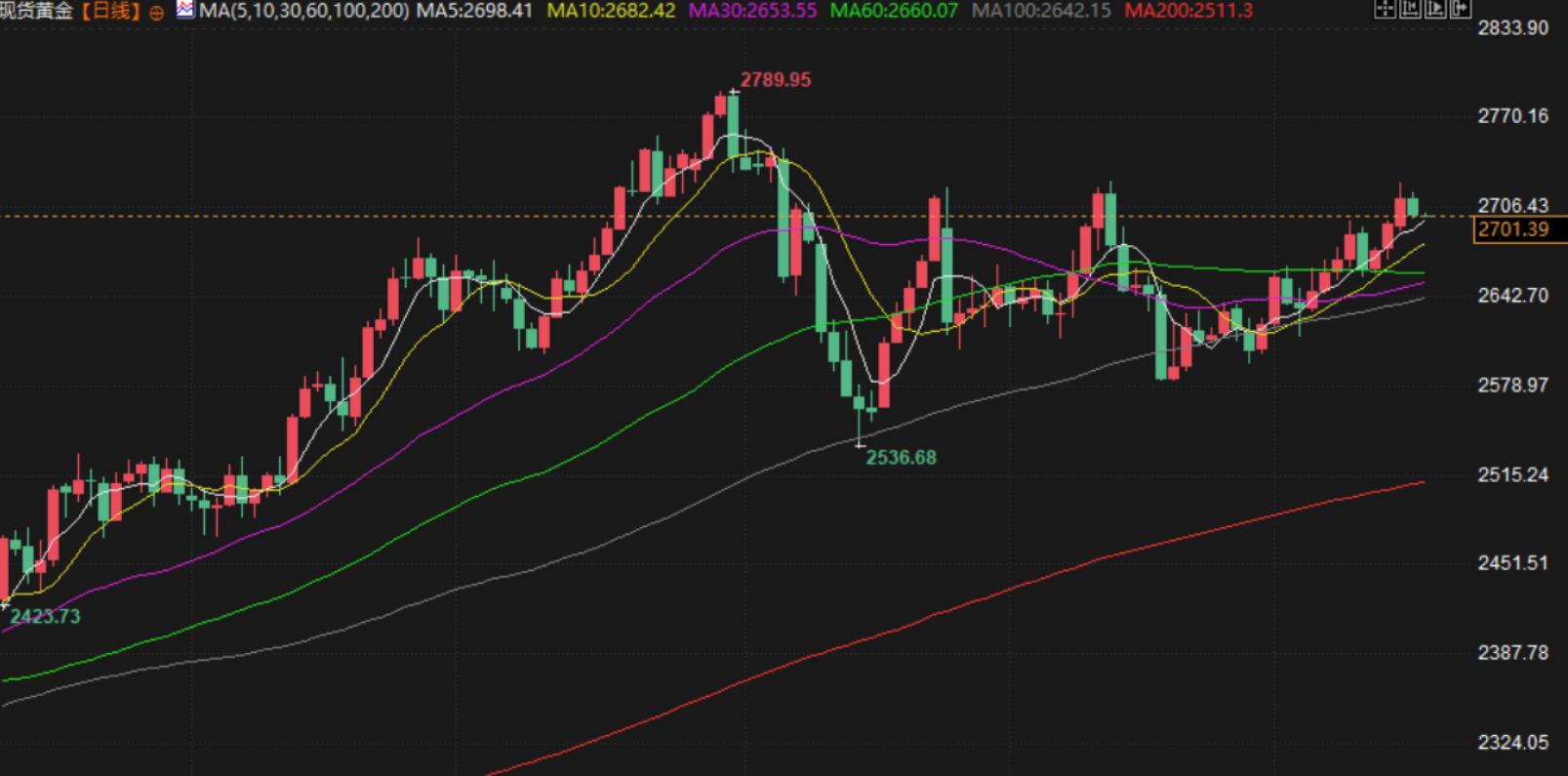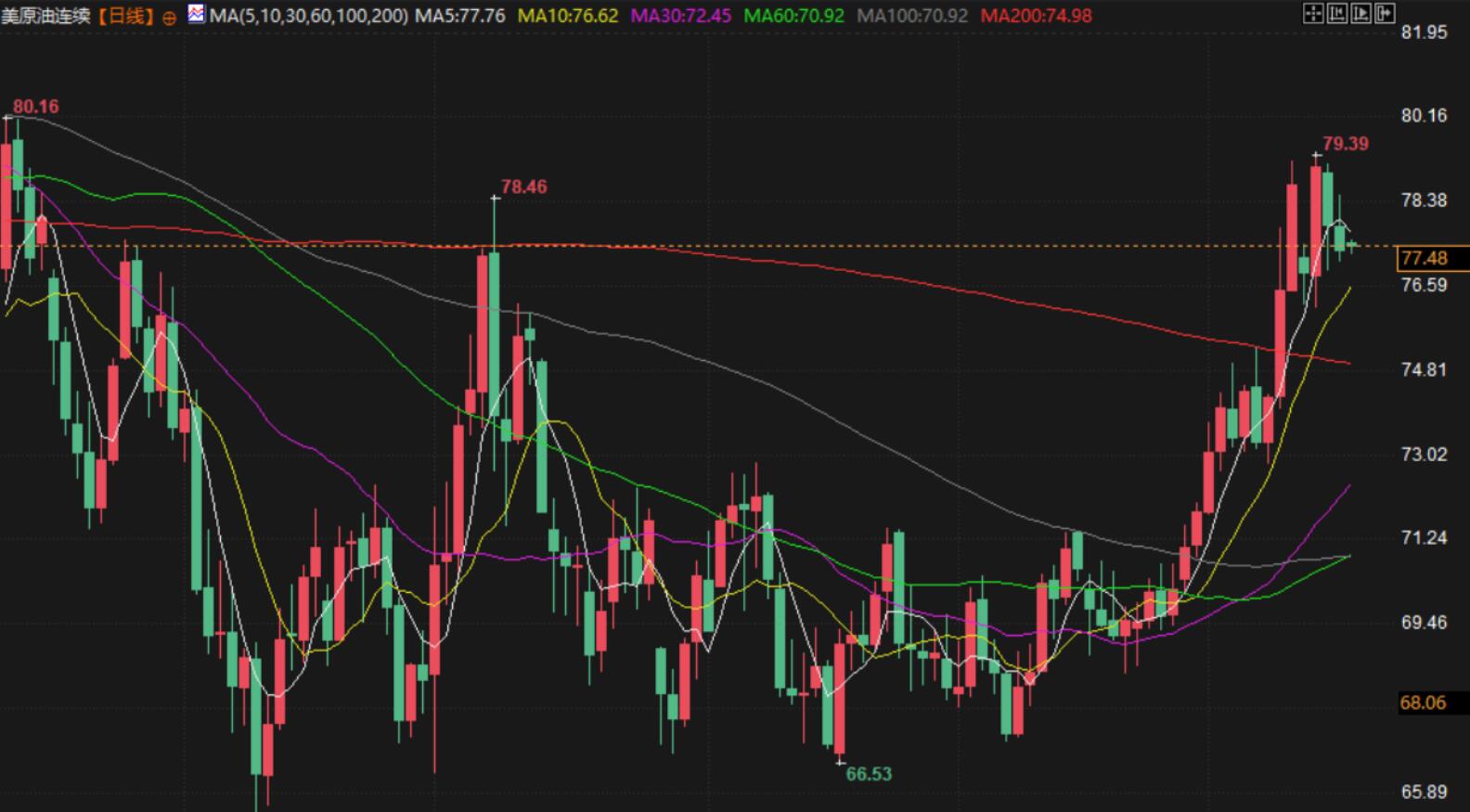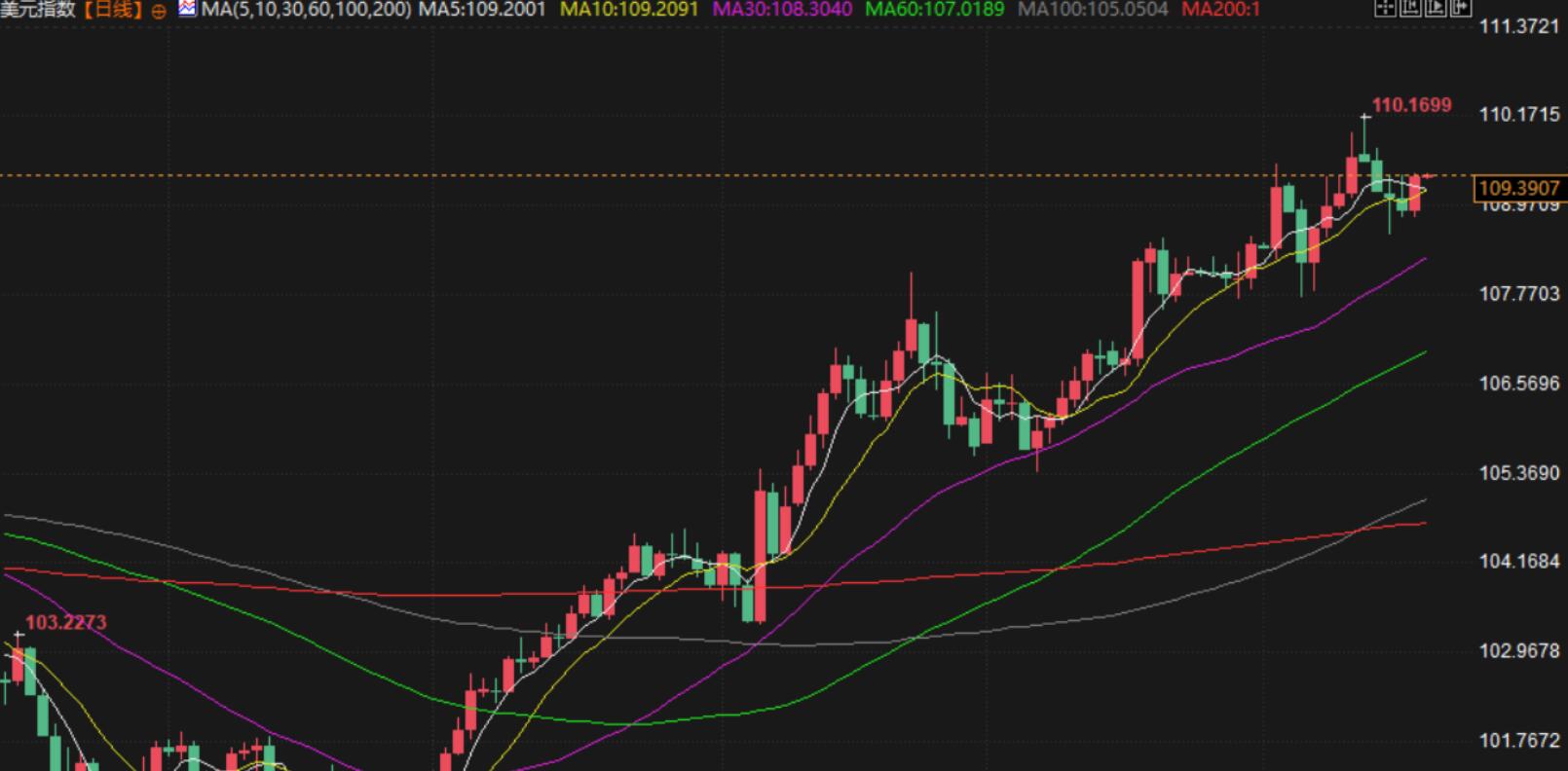Gaza ceasefire agreement reached! Trump is about to take office, and policy uncertainty supports gold prices
On Monday (January 20th Beijing time), spot gold trading was around 2701.42. Trump's inauguration this week reignited support for gold prices due to policy uncertainty and bets on further interest rate cuts; US crude oil traded around $77.66 per barrel, as the latest US sanctions on Russian energy trade have heightened concerns about oil supply disruptions, supporting oil prices. However, the Gaza ceasefire agreement reached over the weekend may limit the increase in oil prices.
The Dow Jones Industrial Average rose 0.78% last Friday to 43487.83 points; The S&P 500 index rose 1.00% to 5996.66 points; The Nasdaq index rose 1.51% to close at 19630.20 points.
equity market
The US stock market rose last Friday, ending a strong week as investors remained optimistic about a series of policy changes under the incoming Trump administration.
The S&P 500 index and Dow Jones Industrial Average recorded their largest weekly percentage gains since early November, while the Nasdaq index also achieved its best performance since early December. This week's data has eased people's concerns about the resurgence of inflation, and at the same time, people's expectations for the Federal Reserve to cut interest rates early and increase the magnitude of interest rate cuts this year have also increased.
The report released by the US Department of Commerce last Friday showed that the construction of single family homes in the United States has reached a new high in 10 months, but demand may be suppressed by rising mortgage rates and oversupply of new homes. Another report shows that manufacturing output surged last month.
US President elect Trump will take office on Monday, and the US market will be closed for the Martin Luther King Day holiday.
In recent weeks, uncertainty has put pressure on the stock market as Trump's tariffs and other policies may reignite inflationary pressures and slow down the pace of the Federal Reserve's interest rate cuts. However, this week's corporate earnings season started well with many large banks releasing their financial reports, which also helped boost the stock market. The S&P 500 Banks Index rose 7.41% last week.
Jim Baird, Chief Investment Officer of Plante Moran Financial Advisors, said, "With strong economic growth and increased corporate profits, at the beginning of this year, you will find many issues with fiscal and monetary policies, as well as what Trump's agenda will look like or take on. Despite all these issues, our start to the year has been much better than in previous years
The benchmark US 10-year Treasury yield rose 1.3 basis points to 4.619%, but fell back from its 14 month high of 4.809% set earlier this week.
Cleveland Federal Reserve Bank President Beth Hammack said inflation remains a problem and recent data shows the economy is resilient. However, Federal Reserve Governor Waller stated last Thursday that due to the possibility of inflation continuing to ease, the Fed may cut interest rates earlier and faster than expected.
According to data from the London Stock Exchange Group (LSEG), the market generally expects the Federal Reserve to keep interest rates unchanged at its policy meeting later this month, with a more than 50% chance of a rate cut of at least 25 basis points before June.
Nine out of the 11 sectors in the S&P 500 index rose, with the non essential consumer goods sector leading the way with a 1.7% increase; The healthcare and real estate sectors fell.
gold market
Gold prices were suppressed by the rise of the US dollar last Friday, but still achieved a weekly increase. The uncertainty of the new US President Trump's policies and bets on further interest rate cuts reignited, causing gold prices to rise above the critical level of $2700.

Spot gold fell 0.45% to $2702.35 per ounce; US gold futures fell 0.1% to $2748.70. David Meger, head of metal trading at High Ridge Futures, said, "Today's pullback was not significant, more of a profit taking trend, perhaps aided by the slight increase in the US dollar during the day, adding some slight pressure
Gold hit a new high in over a month last Thursday, $65.6 short of the historic high of $2790.15 set in October. Last week, the price of gold rose by 0.5%, marking the third consecutive week of increase. Last Wednesday, the lower than expected core inflation data in the United States intensified market speculation that the Federal Reserve had cut interest rates more than once.
Traders expect two interest rate cuts before the end of the year, and Federal Reserve Governor Waller hinted that if economic data further weakens, there may be more interest rate cuts.
The market is currently eagerly anticipating Trump's inauguration ceremony on January 20th, and his extensive trade tariffs are expected to further ignite inflation and trigger trade tensions, potentially increasing the safe haven appeal of gold.
Spot silver fell 2% to $30.17 per ounce; Palladium rose 1% to $949.99; Platinum rose 0.9% to $940.28.
Ajay Kedia, head of Kedia Commodities in Mumbai, said that last week's inflation data supported expectations of interest rate cuts, and the weakening of the US dollar supported gold.
Kedia said, "We believe the support level is at $2694, and if it breaks through the level of $2720, gold prices will move towards a high of $2770
Crude oil market
Oil prices closed lower last Friday, but strengthened for the fourth consecutive week as the latest US sanctions on Russian energy trade intensified concerns about oil supply disruptions.

Brent crude oil futures fell 0.6% to 80.79 per barrel? The US dollar, but rose 1.3% last week. US crude oil futures fell $0.80, or 1%, to $77.88 per barrel, and rose 1.7% this week.
The sanctions against Russia are causing supply shortages in countries such as Europe and India, "said Phil Flynn, senior analyst at Price Futures Group
Investors are still evaluating the potential impact of President elect Trump's return to the White House on Monday. Trump's nominee for Treasury Secretary has stated that he is prepared to impose stricter sanctions on Russian oil.
After the Gaza ceasefire agreement was reached, it is expected that the Houthi armed forces in Yemen will cease their attacks on ships in the Red Sea, which has also put pressure on oil prices.
Earlier last Friday, expectations of increased demand provided some support for the oil market. Last week's data showed that inflation in the world's largest economy, the United States, has eased, increasing expectations for the Federal Reserve to cut interest rates.
Last week, HSBC's report indicated that the bank has raised its 2025 Brent crude oil price forecast from the previous $70 per barrel to $73, with the first quarter forecast also rising from $70 to $77, mainly reflecting the impact of the latest US sanctions on Russia.
foreign exchange market
The USD/JPY held its gains last Friday, but the US dollar index fell last week, ending its six week streak of gains. Investors are waiting for clues about Trump's presidential inauguration ceremony and the direction of incoming government policies.

The Japanese yen hit its strongest weekly performance in over a month, dragging down the US dollar and increasing expectations for the Bank of Japan to raise interest rates this week. The Japanese yen rose more than 1% against the US dollar last week, reversing its previous decline and hitting a one month high of 154.98 yen earlier on Friday. However, the US dollar rose 0.68% against the Japanese yen at the end of the session, closing at 156.165 yen.
Brad Bechtel, Global Head of Foreign Exchange at Furui, stated that the Japanese yen will continue to be closely linked to US interest rates, and I believe the cooling that occurred last week will help alleviate the pressure on the US dollar against the Japanese yen. The Bank of Japan seems ready to raise interest rates this week, which will marginally benefit the yen. However, due to the significant difference in interest rates, it is difficult for the US dollar to truly fall sharply against the Japanese yen.
The statements from Bank of Japan officials and Japanese data pointing to sustained price pressures and strong wage growth have helped boost market confidence in the upcoming interest rate adjustment, with traders seeing an 80% chance of a rate hike this week.
Sources say that the Bank of Japan is likely to not raise interest rates on a weekly basis unless there is any market shock after Trump takes office.
In the past few weeks, the US dollar has surged due to the rise in US Treasury yields, reflecting expectations that Trump's policies may stimulate inflation in an already strong US economy. But on Wednesday, the United States released softer core inflation data, and on Thursday, Federal Reserve Governor Waller said that if the data supports it, it is still possible to cut interest rates three to four times this year, giving the bond market a breathing space from the ruthless sell-off. This has led to increased market bets on the Fed's interest rate cuts this year, putting some pressure on the US dollar before Trump returns to the White House next week. At present, the money market believes that the United States will cut interest rates by about 40 basis points by 2025.
Uto Shinohara, Senior Investment Strategist at Mesirow Currency Management, stated that in response to lower than expected inflation data over the past week, market participants have adjusted their expectations for interest rate cuts from 25 basis points to 40 basis points. It is worth noting that these market expectations have returned to pre strong employment report levels, indicating that the impact of these two economic data is actually offsetting each other. "
He added that this model highlights the sustained sensitivity of the market to inflation and labor market data. As Federal Reserve officials enter a period of silence and there are almost no important US economic data releases next week, Shinohara said, "The market will be watching the beginning of President Trump's term and its potential impact on the market
Investors are now waiting for Trump's inauguration speech to better understand his policy actions and anticipate volatility.
The pound fell 0.6% to $1.2166, not far from the 14 month low it hit last Monday. The data released last Friday showed that retail sales in the UK unexpectedly declined in December, increasing the risk of economic contraction in the fourth quarter.
The euro fell 0.26% against the US dollar to $1.0276. The US dollar index rose 0.34% to 109.33, far from the over two-year high hit earlier last week.
international news
The ceasefire agreement in Gaza Strip has come into effect
According to the latest reports from CNN and other media outlets on the 19th, the ceasefire agreement in the Gaza Strip has come into effect. According to media reports such as Agence France Presse, a spokesperson for the Palestinian Islamic Resistance Movement (Hamas) affiliated armed group, the Kassan Brigade, announced earlier on the 19th the list of three Israeli detainees who will be released that day. The Israeli Prime Minister's Office confirmed on the 19th that it has received a list of three detainees who should be released on the same day provided by Hamas. The ceasefire agreement in the Gaza Strip will come into effect at 11:15 am local time on the 19th.
The ceasefire agreement has come into effect, and 4000 trucks loaded with aid supplies are preparing to enter the Gaza Strip
On January 19th at noon local time, the United Nations Relief and Works Agency for Palestine Refugees in the Near East (UNHCR) announced that the agency has 4000 trucks loaded with aid supplies ready to enter the Gaza Strip, half of which are loaded with food and flour. The agency's chief commissioner, Filip Lazzarini, said that with the ceasefire agreement in effect, attacks on humanitarian aid convoys in the Gaza Strip may decrease. According to Palestinian media reports, with the implementation of the ceasefire agreement, a large number of Palestinians are returning to the Gaza Strip's Rafa area.
New Zealand Prime Minister reshuffles cabinet to promote economy and prioritize health
On January 19th, New Zealand Prime Minister Lakson announced his first major cabinet reshuffle in over a year, with a focus on economic growth and the health sector. Lakson said that the adjusted cabinet will focus on promoting economic growth, improving people's lives, creating more opportunities for businesses, and helping New Zealanders afford first-class healthcare and education. Lakson listed the "solid progress" made in the economy last year, such as a significant decrease in inflation, and stated that Treasury Secretary Nicola Willis will assume the role of Minister of Economic Growth. In addition, the adjustments also include Simon Brown becoming the Secretary of Health, Chris Bishop becoming the Secretary of Transportation, and Judith Collins becoming the Secretary of Public Services.
German Chancellor candidate Mertz: If elected, will build 50 gas-fired power plants
According to reports, opposition leader Mertz, who is expected to become the next Chancellor of Germany, has promised to build 50 gas-fired power plants if his Christian Democratic Union/Christian Social Union wins the elections on February 23.
Hungarian Foreign Minister: Hungary sets new record for importing 7.6 billion cubic meters of Russian natural gas in 2024
Peter Siealdo, Minister of Foreign Affairs and Foreign Economic Relations of Hungary, said that in 2024, Hungary received a record 7.6 billion cubic meters of natural gas from Russia through the "Türkiye Creek" natural gas pipeline. "Last year, 7.6 billion cubic meters of natural gas was transported to Hungary through the 'Turkish Stream', which is an absolute record. In this way, we can ensure that Hungary always has enough natural gas... and ensure that the price of natural gas in Hungary is one of the lowest."
Energy prices rise again, increasing burden on ordinary households in the UK
Affected by the continuous rise in energy prices, the UK has significantly increased the domestic energy price ceiling by about 10% since October last year, which has also caused unbearable suffering for many ordinary British households. The UK energy regulatory agency sets quarterly caps on domestic natural gas and electricity prices. Last October, the agency decided to raise the energy price ceiling by about 10%. On January 1st of this year, the upper limit was raised by 1.2%. These two adjustments have affected approximately 27 million ordinary households in the UK. Compared with that before the outbreak of the Russia-Ukraine conflict in February 2022, the energy bill ceiling of ordinary British families is about 600 pounds higher.
Domestic news
The People's Bank of China and the China Securities Regulatory Commission jointly held a forum on stock repurchase and refinancing
Recently, the People's Bank of China and the China Securities Regulatory Commission jointly held a symposium on stock repurchase and refinancing to further play the role of policy tools in stabilizing the capital market. Stock repurchase and increase in holdings are internationally recognized methods for managing the market value of listed companies. In order to cooperate with the market value management of listed companies, in October 2024, the People's Bank of China, following the principles of marketization and rule of law, jointly with the CSRC and the State Administration of Financial Supervision, created the policy tool of stock repurchase and refinancing, and continued to optimize the policy tool in combination with market concerns, reducing the proportion of self owned funds to 10%, extending the maximum term of loans to three years, encouraging banks to issue credit loans, facilitating banks and enterprises to carry out loan business, and fully meeting the financing needs of market value management of listed companies. Financial institutions have stated that stock buybacks and increased holdings of loan products have been widely welcomed by listed companies and major shareholders. In 2024, listed companies disclosed plans to repurchase and increase their holdings by nearly 300 billion yuan. Since the implementation of policy tools, more than 300 listed companies have issued announcements using bank loans to repurchase and increase holdings, with over 40% of companies having a market value of over 10 billion yuan. The driving effect of policy tools has gradually emerged, playing an important role in maintaining the stable operation of the capital market and boosting market confidence. Listed companies that actively engage in market value management are high-quality enterprises with good operating efficiency and full confidence in their own business development by management. Stock buybacks and increased holdings loans are expected to become new business growth points. The next step will be to fully leverage customer and branch advantages, continuously improve comprehensive financial services for listed companies and major shareholders, and achieve common development between banks and enterprises. (The People's Bank of China)
Tarim Oilfield's ultra deep oil and gas production exceeds 20 million tons
On the 19th, it was learned from China National Petroleum Corporation that the Tarim Oilfield, the largest ultra deep oil and gas production base in China, will produce an equivalent amount of oil and gas below 6000 meters in 2024, exceeding 20 million tons and reaching a new high of 20.47 million tons. At present, Tarim Oilfield has established five main production areas for deep and ultra deep natural gas in the southern foothills of the Tianshan Mountains and the hinterland of the Taklamakan Desert, with a daily production of over 90 million cubic meters of natural gas. Most of this natural gas is extracted from deep formations seven to eight kilometers underground.
Tips:This page came from Internet, which is not standing for FXCUE opinions of this website.
Statement:Contact us if the content violates the law or your rights
